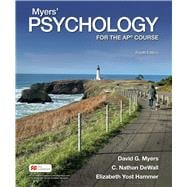Myers' Psychology for the AP® Course, 4th Edition
ISBN: 9781319281168
Myers' Psychology for the AP® Course, 4th Edition, is a comprehensive textbook designed for Advanced Placement (AP) psychology courses. It's a go-to resource for students and educators alike, offering a detailed exploration of psychological principles and meeting the scope and sequence requirements for typical AP psychology courses.
Who Uses It?
This book is primarily used by students and instructors in AP psychology courses at the high school and college levels. It's also a valuable resource for anyone interested in understanding the basics of psychology, including professionals looking to refresh their knowledge or expand their understanding of psychological principles.
History and Editions
The 4th edition of Myers' Psychology for the AP Course has been updated to address user feedback, incorporating the latest research and discussions on diversity within the discipline and across cultures. This edition includes detailed updates on psychological clarity and accuracy, and addresses representation issues in examples and problems. It also includes a modular approach and a wealth of examples with detailed, conceptual explanations, building a strong foundation in the material before asking students to apply what they've learned.
Author and Other Works
David G. Myers, C. Nathan DeWall, and Elizabeth Yost Hammer are the authors of Myers' Psychology for the AP Course. David G. Myers is known for his engaging, conversational writing style and his ability to explain complex concepts clearly and simply. C. Nathan DeWall brings his expertise in social psychology to the text, ensuring that it remains current and relevant. Elizabeth Yost Hammer, a new co-author in this edition, brings a deep knowledge and understanding of the AP psych course based on years of attending the AP reading, including several years as the AP Chief Reader.
Key Features
Comprehensive Coverage: The book covers core concepts in psychology, including detailed explanations and examples.
Diversity and Representation: The text reflects the diversity within the discipline and across cultures and communities.
Updated Research: The 4th edition includes detailed updates on psychological clarity and accuracy.
Modular Approach: The book is designed with a modular approach, making it easy to adapt to different course structures.
Interactive Tools: The text is complemented by Achieve, which includes interactive features such as practice exams and free-response questions.
Detailed Information
ISBNs and Formats
Hardcover: ISBN-13: 9781319281168
eTextbook: Available with Achieve (no specific ISBN provided for eTextbook alone)
Rental Options: Various rental durations available from different retailers
Publication Details
Publisher: Worth Publishers
Publication Date: March 1, 2024
Number of Pages: 1040
Language: English
Item Weight: 6.61 pounds
Dimensions: 9.4 x 1.55 x 11.2 inches
Other Editions and Formats
Previous Editions: Available through Worth Publishers and other retailers
Related ISBNs: No additional ISBNs found for different formats or editions of this specific book.









